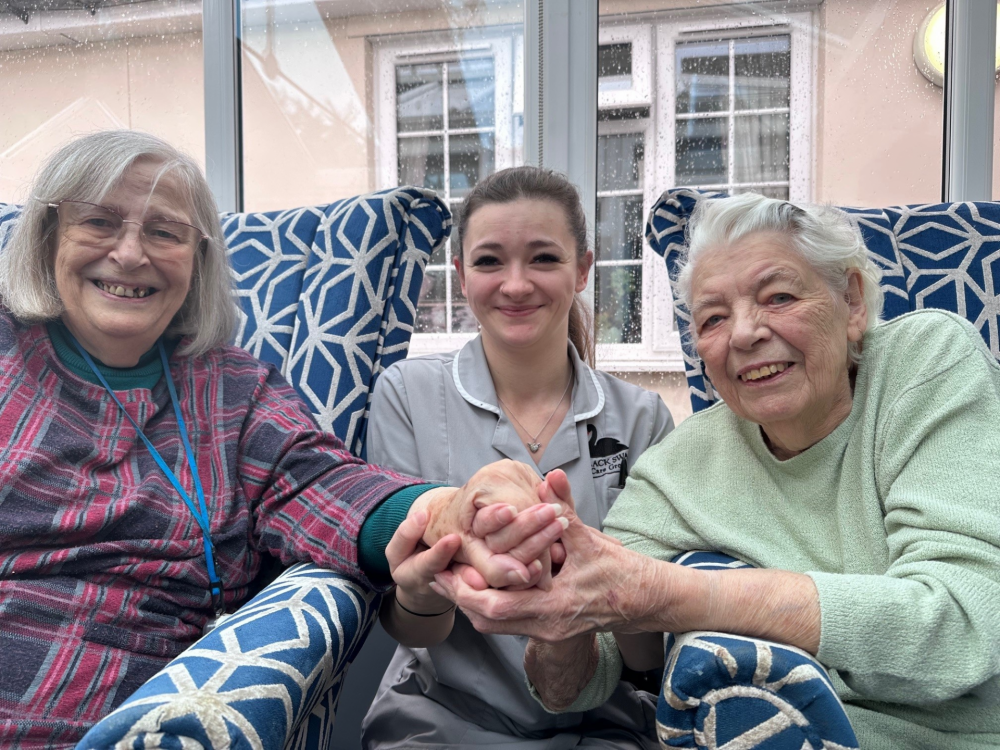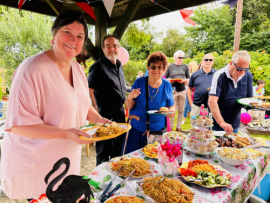Lyndsey Shares Her Apprenticeship Journey at Care Home in Hunstanton
07/02/2025


It’s National Apprentice Week from 10th to 16th February 2025.
We have 45 apprentices across all our homes, studying for various qualifications. We visited Nightingale Lodge to ask Lyndsey Pollock, the Deputy Manager at the home in Hunstanton, West Norfolk a few questions about her experience of studying for her Health and Social Care qualifications.
How long have you worked for Black Swan & where?
I joined Black Swan in June 2020, right at the start of the Covid pandemic! I started as a carer at Nightingale Lodge. Since then, I’ve mostly been at Nightingale Lodge, but have done some shifts at Kings Lynn, The Beeches, Park House and Westfield House.
What roles have you done for us up to your current roles as Deputy Manager?
I joined as a Care Assistant in June 2020, and after about 12 months became a Senior. Then in October 2022 I nearly left Black Swan, but decided to stay and started as a Trainee Deputy and became a full Deputy Manager in May 2023.
What level have you got to?
I’m currently studying for my Level 5 qualification (it goes up to Level 7). Having completed my Level 3 in 2023, I started my Level 5 in March 2024 and hope to complete it in April 2025.
How are you supported a. by Nightingale/Black Swan and b. by HIT training?
I have a mentor at HIT Training, Rosie. We speak regularly and she sets modules for me to complete either via a training portal or in verbal assessments. I’m also supported by Sandra, our manager at Nightingale Lodge. When Rosie and I review each module, Sandra often reviews them with me as well and I’m scored based on their feedback. Our Regional Manager Ria sometimes also sits in on the assessment sessions.
If the module isn’t fully completed, Rosie and HIT will set another assignment which might be assessed as observations or via course work.
Which bits have you enjoyed most?
Rosie and I have what are called ‘professional discussions’ which are recorded. These are often a bit easier than written assignments as I sometimes find it easier to talk through a scenario than write it down. I’ve discovered that I’m a good waffler! These discussions sometimes cover more than one area of the qualification.
Some of the subjects in a Level 5 qualification include: Safeguarding, Working in Partnership (with NHS, Community Nurses, Drs etc), Managing Stress (my own and other staff members), Staff performance and supervisions. Often, a real life example of a Safeguarding situation in the home counts towards product evidence.
Have there been any that you’ve found more difficult and how did you overcome that?
Sometimes you look at a module and the different subject areas look a bit overwhelming. But then, when you look again, you often see that the scenarios come up at the home, so I can use them as a real life example when I feedback to my tutor and Sandra.
How hard has it been to do the studying and work at the same time?
To be really honest, I thought it’d be harder. I sometimes do the assignments at home on my days off, but as I said, a lot of the time, I have real life examples that I can use – it’s just remembering to document it afterwards as part of the assessment.
How much time does it take?
On average, I spend about 6 hours a week on top of my usual work rota. Sometimes I do an hour after I finish, or other times, I leave it for a couple of days and spend a bit longer. I don’t like leaving it too long, but I did once have to catch up after about 2 weeks of not doing any, which was a bit difficult – so I’m never doing that again!
Level 3 took me about 12 months to complete and Level 5 will be a bit longer, but not too much.
Lastly, would you recommend it to others and why?
I 100% recommend doing it. If you’re put forward or want to do it for yourself, a lot can be covered in your day-to day role and I’ve found it really motivates me. I can feel progression in my own knowledge and confidence in my role.
I’ve enjoyed doing both the Level 3 and the Level 5. It was great to get the recognition when I passed my Level 3.
As you’d expect, the Level 5 is harder – it covers lots more and is much more in depth. Everyone who works in a care home ‘cares’, but doing the courses and the apprenticeship has convinced me even more that working in care is the right career for me. It reinforces the reason why you do your job and it just makes you care more.






